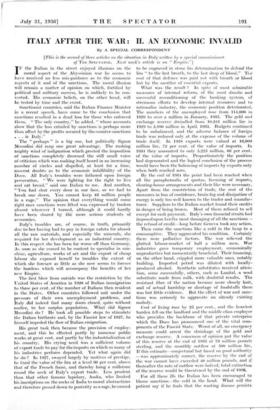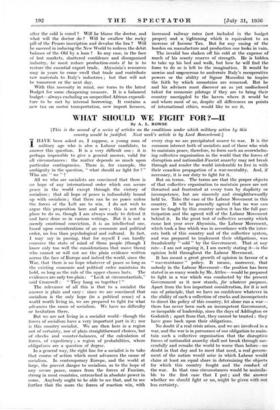ITALY AFTER THE WAR : II. AN ECONOMIC INVALID
By A SPECIAL CORRESPONDENT
[This is the second of three articles on the situation in Italy written by a special commissioner of THE SPECTATOR. Next week's article is on " Empire."] IF the Italian in the street enjoyed illusions on the moral aspect of the Abyssinian war he seems to have received no less mis-guidance as to the economic aspects of it and of the sanctions. The moral illusion will remain a matter of opinion 'on which, fortified by political and military success, he is unlikely to be con- verted. His economic beliefs, on the other hand, will be tested by time and the event.
Sanctionist countries, said the Italian Finance Minister in a recent speech, have come to the conclusion that sanctions resulted in a dead loss for those who enforced them. " The only country," he added, " whose accounts show that the loss entailed by sanctions is perhaps more than offset by the profits secured by the counter-sanctions . . is Italy."
The " perhaps " is a big one, but politically Signor Mussolini did reap one great advantage. The rushing mighty wind of indignation which greeted the imposition of sanctions completely drowned the still small voice of criticism which was making itself heard in an increasing number of circles and dispelled, at least for a time, nascent doubts as to the economic infallibility of the Duce. All Italy's troubles were fathered upon foreign persecution. " We were fighting for the right to live and eat bread," said one Italian to me. And another, "You had shut every door in our face, so we had to break one down. You cannot keep 43 million people in a cage." The opinion that everything would come right once sanctions were lifted was expressed by traders almost wherever I turned, although it could hardly have been' shared by the more serious students of economics.
Italy's troubles are, of course, in truth, primarily due to her having had to pay in foreign valuta for almost all the raw materials, and especially the minerals, she required for her development as an industrial country. In this respect she has been far worse off than Germany. As soon as she ceased to be content to specialise in sun- shine, agriculture, works of art and the export of cheap labour she exposed herself to troubles the extent of which she foresaw as little as she now seems to foresee the burdens which will accompany the benefits of her new Empire.
The first blow from outside was the restriction by the United States of America in 1920 of Italian immigration to three per cent. of the number of Italians then resident in the States. Other countries followed suit under the pressure of their own unemployment problems, and Italy did indeed find many doors closed, quite without malice, to her surplus population. What did Signor Mussolini do ? He took all possible steps to stimulate the Italian birthrate and, by the Fascist law of 1927, he himself impeded the flow of Italian emigration.
His great task then became the provision of employ- ment, and this he effected partly by immense public works at great cost, and partly by the industrialisation of his country. His crying need was a sufficient volume of export trade to pay for the imports on which so many of his industries perforce depended. Yet what again did he do ? In 1927, swayed largely by motives of prestige, he fixed the value of the lira at a level 30 per cent. above that of the French franc, and thereby hung a millstone round the neck of Italy's export trade. Less prudent than that other famous lapidary, Asoka, who limited his inscriptions on the rocks of India to moral abstractions and therefore passed down to posterity as a sage, he caused to be engraved in stone his determination to defend the lira " to the last breath, to the last drop of blood." The cost of that defence was paid not with breath or blood but by the sacrifice of essential exports.
What was the result ? In spite of most admirable measures of internal reform, of the most drastic and successful reconditioning of the banking system, of strenuous efforts to develop internal resources and to rationalise industry, the economic position deteriorated. The numbers of the unemployed rose from 114,000 in 1926 to over a million in January, 1935. The gold and exchange reserve dwindled from 10,341 million lire in 1929 to 5,890 million in April, 1935. Budgets continued to be unbalanced, and the adverse balance of foreign trade was reduced only at the expense of the volume of trade itself. In 1928 exports were valued at 16,000 million lire, 72 per cent. of the value of imports. In 1934 they amounted to only 5,225 million, 68 per cent. of the value of imports. Proportionately the position had degenerated and the logical conclusion of the process would have been the balancing of imports by exports only when both reached zero.
By the end 'of 1934 the point had been reached when all the paraphernalia of quotas, licensing of imports, clearing-house arrangements and their like were necessary.
Apart from the constriction of trade, the cost of the measures in loss of confidence, brain-fag and dissipation of energy is only too well known to the trader and manufac- turer. Suppliers to the Italian market found their credits in danger of being frozen. Most of them refused to sell except for cash payment. Italy's own financial straits had imposed upon her the most damaging of all the sanctions— the refusal of credit—long before Geneva took any action. Then came the sanctions like a cold in the heap to a consumptive. They aggravated his condition. Certainly there were palliative factors. The war relieved the glutted labour-market of half a million men. War industries gave temporary employment, economically unproductive but momentarily beneficial. Their financing, on the other hand, crippled more valuable ones, notably building. Imported petrol was diluted with locally- produced alcohol. Synthetic substitutes received atten- tion, some successfully, others, such as Lanital, a wool substitute made from milk, with doubtful results. The resistant fibre of the nation became more closely knit, and of actual hardship or shortage of foodstuffs there was but little evidence. But the effect of war and sanc- tions was seriously to aggravate an already existing malady.
Cost of living rose by 25 per cent., and the heaviest burden fell on the landlord and the middle-class employer who provides the backbone of that private enterprise 'which the Duce has pronounced one of the vital com- ponents of the Fascist State. Worst of all, no emergency measure could arrest the shrinkage of the gold and exchange reserve. A consensus of opinion put the value of this reserve at the end of 1935 at 73 million pounds sterling, and the monthly outflow at 500 million lire.
If this estimate—conjectural but based on good authority —was approximately correct, the reserve by the end of the war cannot have exceeded 40 million pounds, and if thereafter the rate of outflow were halved, total extinction of the reserve would be threatened by the end of 1936. For all these ills the Italian has been encouraged to blame sanctions—the cold in the head. What will the patient say if he finds that the wasting disease persists after the cold is cured ? Will he blame the doctor, and what will the doctor do ? Will he swallow the rocky pill of the Pesaro inscription and devalue the lira ? Will he succeed in inducing the New World to redress the debit- balance of the Old by a loan ? In any case, in the face of lost markets, shattered confidence and disorganised industry, he must reduce production-costs if he is to restore the essential export trade. Abyssinia's resources may in years to come swell that trade and contribute raw materials to Italy's industries ; but that will not be tomorrow or the next day.
With this necessity in mind, one turns to the latest Budget for some cheapening measure. It is a balanced budget—always excluding an unspecified African expendi- ture to be met by internal borrowing. It contains a new tax on motor transportation, new import licences, increased railway rates (not included in the budget proper) and a- tightening which is equivalent to an increase of income Tax. But for any easing of the burden on manufacture and production one looks in vain.
The invalid has shaken off his cold at the expense of much of his scanty reserve of strength. He is bidden to take up his bed and walk, but how he will find the form to do so is left to the imagination. It would be unwise and ungenerous to underrate Italy's -recuperative powers or the ability of Signor Mussolini to inspire the faith by which mountains are removed. But he and his advisers must discover an as yet undisclosed talent for economic pilotage if they are to bring their country uncrippled to the haven where it would be and where most of us, despite all differences on points of international ethics, would like to see it.







































 Previous page
Previous page